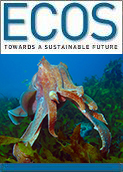
|
Published: 16 September 2013
Food waste harms climate, water, land and biodiversity: FAO
The waste of a staggering 1.3 billion tonnes of food per year is not only causing major economic losses but also wreaking significant harm on the natural resources that humanity relies upon to feed itself, says a new FAO report.

|
|
Every item of food contains embodied carbon and water: the further along the production chain it is lost, the greater the loss of water and carbon emissions. Credit:
D Sharon Pruitt/ CC BY 2.0
|
Food Wastage Footprint: Impacts on Natural Resources is the first study to analyse the impacts of global food wastage from an environmental perspective, looking specifically at its consequences for the climate, water and land use, and biodiversity.
The results show that, each year, food that is produced but not eaten uses up a volume of water equivalent to the annual flow of Russia's Volga River, and is responsible for adding 3.3 billion tonnes of greenhouse gases to the planet's atmosphere.
Beyond its environmental impacts, the direct economic consequences to producers of food wastage (excluding fish and seafood) run to the tune of US$750 billion annually, FAO's report estimates.
‘All of us – farmers and fishers, food processors and supermarkets, local and national governments, individual consumers – must make changes at every link of the human food chain to prevent food wastage from happening in the first place, and re-use or recycle it when we can't,’ said FAO Director-General, José Graziano da Silva.
‘We simply cannot allow one-third of all the food we produce to go to waste or be lost because of inappropriate practices, when 870 million people go hungry every day,’ he added.
FAO has also published a comprehensive ‘tool-kit’ that contains recommendations on how food loss and waste can be reduced at every stage of the food chain.
The tool-kit profiles a number of projects around the world that show how national and local governments, farmers, businesses, and individual consumers can take steps to tackle the problem.
Achim Steiner, UN Environment Programme (UNEP) Executive Director, said: ‘UNEP and FAO have identified food waste and loss –as a major opportunity for economies everywhere to assist in a transition towards a low-carbon, resource-efficient and inclusive Green Economy.
‘Today's report by FAO underlines the multiple benefits that can be realized, in many cases through simple and thoughtful measures by households, retailers, restaurants, schools and businesses. These measures can contribute to environmental sustainability, economic improvements, food security and the realisation of the UN Secretary General's Zero Hunger Challenge.
UNEP and FAO are founding partners of the Think Eat Save: Reduce Your Foodprint campaign that was launched earlier in the year.
Fifty-four percent of the world's food wastage occurs ‘upstream’ during production, post-harvest handling and storage, according to FAO's study. Forty-six percent of it happens ‘downstream,’ at the processing, distribution and consumption stages.
As a general trend, developing countries suffer more food losses during agricultural production, while food waste at the retail and consumer level tends to be higher in middle- and high-income regions – where it accounts for 31–39 per cent of total wastage – than in low-income regions (4–16 per cent).
The later a food product is lost along the chain, the greater the environmental consequences, FAO's report notes, since the environmental costs incurred during processing, transport, storage and cooking must be added to the initial production costs.
A combination of consumer behaviour and lack of communication in the supply chain underlies the higher levels of food waste in affluent societies, according to FAO.
Consumers fail to plan their shopping, over-purchase, or over-react to ‘best-before-dates,’ while quality and aesthetic standards lead retailers to reject large amounts of perfectly edible food.
In developing countries, significant post-harvest losses in the early part of the supply chain are a key problem, occurring as a result of financial and structural limitations in harvesting techniques and storage and transport infrastructure, combined with climatic conditions favourable to food spoilage.
The report notes that uneaten food rotting in landfill is a large producer of methane, a particularly harmful greenhouse gas.
Source: FAO



